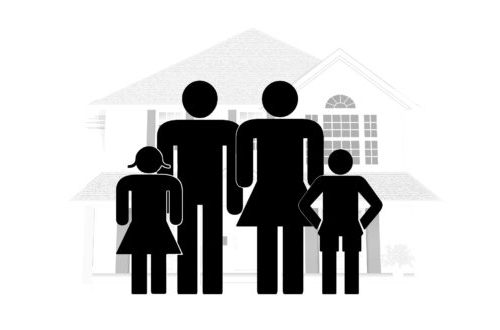What are the legal considerations of living together without being married?
There is a misconception that unmarried couples who live together are in a ‘common law marriage’ which gives them similar legal rights to those who are married in law. Unfortunately, this is not the case and unmarried couples have limited financial claims against each other when they separate. Usually, this applies to claims against property and claims for the benefit of children only. This blog shall consider those claims in more detail.
Property in joint names
If you are living in a house that is jointly owned by both of you, then each of you have a legal right to remain in the property after your relationship breaks down. A legal owner cannot be compelled to vacate the property unless they agree to voluntarily move out, or by court order excluding them from the property. This is known as an Occupation Order, which is made in exceptional circumstances, often where there is a significant risk of harm to one party. Because of the serious nature of these types of orders, there is a high evidential threshold, and it is strongly recommended that you take legal advice before making an application.
If you decide to sell the property following the breakdown of your relationship, the net proceeds of sale (after redemption of a mortgage and payment of estate agents’ charges and conveyancing solicitors’ fees) can be divided between you by agreement. In the absence of agreement, the starting presumption is usually that the net proceeds of sale should be divided between you in accordance with how you own the equity in the property.
Joint tenants
If you are registered as joint tenants of the property, this means that together, you own the entire equity in the property, rather than having distinct shares. There is a presumption that the property is owned equally and as such, the net proceeds of sale should be divided between you in equal shares.
Tenants in common
If you are registered as tenants in common, this means that you each own distinct shares of the equity in the property. In the absence of a Declaration of Trust, which sets out your respective shares, it shall be presumed that you each own equal shares of the equity.
In both cases above, the starting presumption as to the division of the net proceeds of sale can be rebutted by evidence to suggest that one party should receive a larger share, notwithstanding how the ownership of the property is registered. These types of claims are highly fact-specific and the party who is seeking an enhanced share of the net proceeds of the sale will be required to demonstrate evidentially, or by reference to the parties’ conduct, that this is justified. Again, given the complexity of such claims, it is important to seek legal advice at an early stage.
Property in one party’s name
Even if you are living in a property that is legally owned by one of you, it may be the case that you have an interest in the equity in the property by virtue of a Declaration of Trust. This document may have been used to record your agreement as to how your interest in the property would arise, for example, by way of contribution to the mortgage repayments.
In the absence of a Declaration of Trust, it may still be possible to demonstrate that you have an interest in the equity in the property if you can establish one of the following:
- There was a common understanding between you that you would acquire an interest and you have acted to your detriment in relying upon that understanding. For example, you have been contributing to the mortgage repayments or have financially contributed to significant improvements to the property, which have increased its market value
- You were made to believe, by way of express statements made by your partner, or by way of their conduct during your relationship, that you would acquire an interest in the property.
Children
If you have children together, then both parents have a legal obligation to financially maintain them. If, after your relationship breaks down, you become the primary caregiver to the children, you may be entitled to receive child maintenance payments from the other party. This is calculated in accordance with the Child Maintenance Service guidelines and a link to an online calculator can be found at the following page:
https://www.gov.uk/calculate-child-maintenance
If the paying parent’s income exceeds £3,000 gross per week or £156,000 gross per annum, a separate application can be made to court for a ‘top-up’ order in relation to child maintenance payments.
In addition, the court also has the power to make the following orders in respect of children where the parents are unmarried:
- A lump sum order for periodical payments to cover expenses, such as school fees
- A transfer of a property or for a property to be held on trust for the benefit of the children until the youngest child of the family attains the age of 18 years or completes their full-time secondary education, whichever is the later to occur, whereupon the property, or the net proceeds of the sale of that property, shall revert to the other parent.
In deciding whether to make these orders, the court shall consider the following:
- The present and future financial circumstances of each parent
- The financial needs of the children concerned
- The income, earning capacity, property and other financial resources of the parties and the children, if relevant
- Whether the children have any physical or mental disabilities and the impact of those disabilities
- Current arrangements as to the children’s education and the parties’ intentions as to their future education
At Tisshaws, we can advise you on your financial rights pertaining to property and children arising when a cohabiting relationship has broken down. We offer an initial consultation for up to one hour for £50.00 (incl. VAT) where you can receive advice specific to your situation, with no obligation to instruct us afterwards. To book an initial consultation, please contact our Reception on 01444 472700, email [email protected] or complete the form below.

Book a consultation to discuss your options –
Only £100 (Incl. VAT)
We know how difficult divorce and separation can be, so we offer an initial one hour fixed fee consultation with a fully qualified lawyer, to help you make an informed decision about how to proceed.
To book, please call 01444 472700 or complete the quick contact form.
